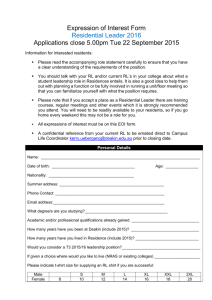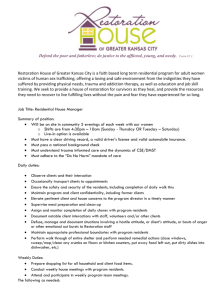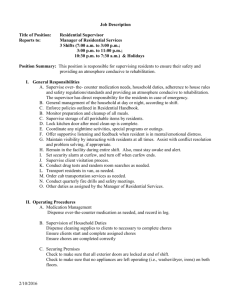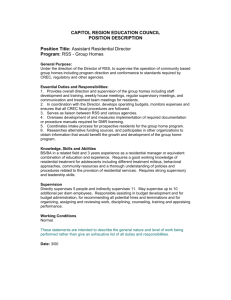Humanism Application
advertisement
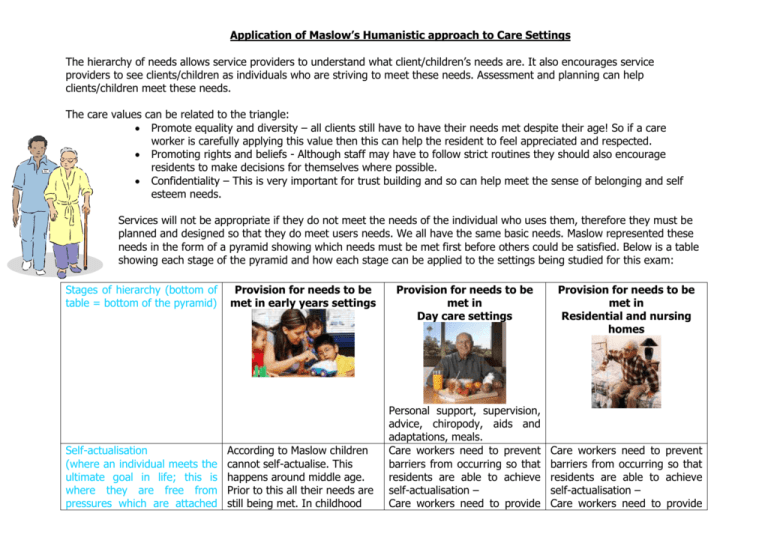
Application of Maslow’s Humanistic approach to Care Settings The hierarchy of needs allows service providers to understand what client/children’s needs are. It also encourages service providers to see clients/children as individuals who are striving to meet these needs. Assessment and planning can help clients/children meet these needs. The care values can be related to the triangle: Promote equality and diversity – all clients still have to have their needs met despite their age! So if a care worker is carefully applying this value then this can help the resident to feel appreciated and respected. Promoting rights and beliefs - Although staff may have to follow strict routines they should also encourage residents to make decisions for themselves where possible. Confidentiality – This is very important for trust building and so can help meet the sense of belonging and self esteem needs. Services will not be appropriate if they do not meet the needs of the individual who uses them, therefore they must be planned and designed so that they do meet users needs. We all have the same basic needs. Maslow represented these needs in the form of a pyramid showing which needs must be met first before others could be satisfied. Below is a table showing each stage of the pyramid and how each stage can be applied to the settings being studied for this exam: Stages of hierarchy (bottom of table = bottom of the pyramid) Self-actualisation (where an individual meets the ultimate goal in life; this is where they are free from pressures which are attached Provision for needs to be met in early years settings According to Maslow children cannot self-actualise. This happens around middle age. Prior to this all their needs are still being met. In childhood Provision for needs to be met in Day care settings Personal support, supervision, advice, chiropody, aids and adaptations, meals. Care workers need to prevent barriers from occurring so that residents are able to achieve self-actualisation – Care workers need to provide Provision for needs to be met in Residential and nursing homes Care workers need to prevent barriers from occurring so that residents are able to achieve self-actualisation – Care workers need to provide to previous levels/stages of they will not have developed a dev and they are now free to full identity/personality. explore who they have ‘become’ – they are likely to be more independent, feel emotionally fulfilled, have positive social development as they will have a greater acceptance of others and realistic perception of self) Self-esteem Needs (need to be recognised and acknowledged. Need to feel respected. This need is met by success being recognised too. Self-esteem is part of an individuals emotional development ) (Cognitive needs – we require stimulation/activities to promote knowledge and understanding; success here will affect an individual’s selfconcept) (Aesthetic needs – the need to experience beauty, truth etc – this will have a direct effect on EYWs should respect children so they feel they are being listened to and valued e.g. set aside time to listen to their worries and views. Answer questions that they pose. Staff must be trained and aware of cultural differences so that they respect these in the children. Praise is so important for self-esteem. Encouragement to complete tasks so as they can see that they succeed. Group recognition of interests/achievements can be seen through activities such as show and tell and circle time. A good way to relax the opportunities for service users so that they can self-actualise. Self actualisation is something that occurs when all our other needs are met. This involved accomplishing something we’d never thought we could achieve due to not having the physical or emotional space because of meeting our other needs. This will be things like providing services outside of the centre that will meet their ‘searching needs’ i.e. playing a musical instrument, learning to cook Indian food, learning to jive. Service users need to feel respected. They need to be provided with independence and treated as an individual. We need to value people for who they are e.g. use their name when addressing them, respect their cultural beliefs and needs. A day care centre provides advice as a service therefore listening to service user’s worries and views is paramount in meeting this need. Encouragement to complete tasks so as they can see that they succeed. Group recognition of opportunities for service users so that they can self-actualise. Self actualisation is something that occurs when all our other needs are met. This involves accomplishing something we’d never thought we could achieve due to not having the physical or emotional space because of meeting our other needs. This will be things like providing services outside of the home that will meet their ‘searching needs’ i.e. playing a musical instrument, learning to cook Indian food, learning to jive. Service users need to feel respected. They need to be provided with independence and treated as an individual. We need to value people for who they are e.g. use their name when addressing them, respect their cultural beliefs and needs. When people live in a setting one must actually provide for cultural needs rather than just respect it e.g. a room to pray would be essential as they live there and cannot go home to do it. A residential setting should provide emotional support for service users; therefore listening to service user’s our emotional development) children and start a circle time session, is by teaching and gradually building up to a simple game. The objective is to arrive at a situation where everyone gets the chance to speak, and to provoke an open discussion, to give time to celebrate achievements and then to provide time to calm down and bring closure to the setting. interests/achievements can be seen through activities such as appropriate awards at a presentation evening i.e. best chess player of the year. They could also celebrate achievements through exhibition – art and gardening. It is very important to help them feel as if they have a purpose in life i.e. making necklaces or knitting baby clothes to sell at the village fete. Apply the care values efficiently so that the individual develops or maintains a healthy self-esteem. Giving them options so that they can choose things for themselves (promoting individual rights and beliefs) worries and views is paramount in meeting this need. Encouragement to complete tasks so as they can see that they succeed. Group recognition of interests/achievements can be seen through activities such as appropriate awards at a presentation evening i.e. best chess player of the year. They could also celebrate achievements through exhibition – art and gardening. It is very important to help them feel as if they have a purpose in life i.e. making necklaces or knitting baby clothes to sell at the village fete. Good working relationships need to be developed with service provider and user a balance of being friendly and professional is required to meet the selfesteem needs of somebody residing in a setting. Apply the care values efficiently so that the individual develops or maintains a healthy self-esteem. Giving them options so that they can choose things for themselves (promoting individual rights and beliefs) Love and Belongingness (attachment to primary carer, feeling socially included. There is a need for love and affection to be shown towards the service user. Individual can then build on both their social and emotional development) EYWs should build up a relationship with children to prevent children from feeling isolated and that they belong. Lots of group activities should be planned to build group cohesion. Activities to promote friendships between children should also be encouraged e.g. board games, role-play. Good working relationships with parents are also important between EYW and parent. Child needs to see this in order to feel they are loved and belong at the setting. Care workers need to provide safe, supportive relationships for service users. This is encouraged through group activities. Service users are usually encouraged to be involved in planning the care and development of themselves as well as the day care centre as a whole. Day care centres need to be involved in the wider community and market themselves as a nice place to be as well as this it is important for the service users so as they too can become part of the wider community and feel as if they belong in the community. Service providers need to be in contact with the family of service users so as the user feels as if s/he is loved and valued as they communicate about him/her. Older people need to be able to talk to professional care workers about their interests and problems too in order to feel they ‘belong’ at the day care centre. Keeping information on the service user confidential so that the individual can build a trusting relationship with the Residential care workers need to provide safe, supportive relationships for service users. This is encouraged through group activities. Service users are usually encouraged to be involved in planning the care and development of themselves as well as the running of the home. Residential settings to be involved in the wider community and market themselves as a nice place to live, as well as this it is important for the service users so as they too can become part of the wider community and feel as if they belong in the community. Service providers need to be in contact with the family of service users so as the user feels as if s/he is loved and valued as they communicate about him/her. Often in a residential setting residents will have their own responsibilities that contribute to the running of the home e.g. Marj does the tea and coffees of an evening, Fred waters the plants and so on. This helps them to feel as if they live in the home and belong to it. Safety/security Needs (freedom from threat, danger, intimidation. To feel safe physically and emotionally – thi allows for development of skills such as independence and emotional security) EYWs should keep dangerous objects e.g. scissors. away from children. The doors should be locked at all times (staff have an access code/key). Risk assessments should be carried out on a daily basis to maintain standards of the build and equipment. Emotional safety should also be maintained e.g. the key worker system is used care worker and allow them to feel that what they tell the care workers are going to be kept confidential Care workers should try to understand the service user’s challenging behaviour by encouraging them to talk about their needs and worries. Care workers should recognise that personal development comes from the love and respect from others. So to put that into practise the care worker should make sure that the client is treated in a way that they would treat someone they loved or respected regardless of their behaviour. Keeping information on the service user confidential so that the individual can build a trusting relationship with the care worker and allow them to feel that what they tell the care workers are going to be kept confidential Care workers should try to understand the service user’s challenging behaviour by encouraging them to talk about their needs and worries. Care workers should recognise that personal development comes from the love and respect from others. So to put that into practise the care worker should make sure that the client is treated in a way that they would treat someone they loved or respected regardless of their behaviour. Care workers need to provide a secure and safe environment for service users. Physical security = the building is safe and risk assessments are carried out on this by the staff. A key system so if necessary strangers cannot get in or service users wander off. Able residents will have their own access/departure arrangements i.e. a swipe card Residential care workers need to provide a secure and safe environment for service users. Physical security = the building is safe and risk assessments are carried out by the staff. A key system is used to prevent strangers getting in or service users wander off. Able residents may have their own access arrangements i.e. a swipe card to enter and exit so as a child can form a special bond with a carer to enable them to feel secure. Carers should maintain a healthy emotional atmosphere e.g. bullying must be stopped and disputes resolved. Many children are anxious about making the move from nursery to primary school. Circle time, buddies and mentors are some of the ways of calming anxieties and answering questions. to enter and exit the building. The resources in the building need to be up to a required standard e.g. the hoists are charged before use, the wheelchairs have sufficient breaks. The activities provided to meet physical needs have to be safe and risk assessed before using. Supervision is a role of a day care centre – residents will feel safer if you are supervising them walking down the corridor to go to toilet by themselves for example. Emotional safety = All staff are trained and CRB checked – service users know this and this contributes to their sense of safety. There will be equal ops and bullying policies to monitor and evaluate any issues which should arise for the service users and providers. As part of their job role service providers encourage relationships between the service users – this aids in making service users feel safe once they have developed bonds with others. . Counselling can be offered in a day care setting to reduce anxiety and help the client to feel emotionally safe. the building. The resources in the building need to be up to a required standard e.g. the hoists are charged before use, the wheelchairs have sufficient breaks. The activities provided to meet physical needs have to be safe and risk assessed before using. Supervision is a role of residential care staff – residents will feel safer if you are supervising them walking down the corridor to go to toilet by themselves for example. Emotional safety = Most staff are trained and CRB checked – service users know this and this contributes to their sense of safety. There will be equal ops and bullying policies to monitor and evaluate any issues which should arise for the service users and providers. As part of their job role service providers encourage relationships between residents – this aids in making service users feel safer once they have developed bonds with others. Each resident has their own bedroom where they can feel safe to have solitary time and quality sleep (residents who do Physical Needs (food, warmth, shelter – generally understood to be basic needs which need to be met before individual can progress onto higher levels/stages) EYWs should provide children with activities so that their basic needs can be met e.g. nap time, food, frequent drinks, play equipment to enhance physical development. Hygiene standards to prevent illness for the children. Advice would be provided for parents on immunisations and vaccinations and the appropriate age for each one. It is the responsibility of the EYW to suggest a child sees a doctor if illness is suspected. Care workers need to provide basic needs for service users, such as meals. Day care centres provide this as part of their service. They also provide other health care e.g. chiropody, maybe a hairdresser, some may provide baths i.e. some service users may not bath themselves at home due to being unable to get in and out of the bath, so they will come to a day care centre for this. Activities to maintain physical health are also paramount e.g. armchair yoga, walking round the gardens; carers may help with exercises specific to their condition i.e. a stroke patient. Careful assessment and care planning can help service users to meet their physical needs. not get enough sleep are often tearful and moody). Counselling can be offered in a day care setting to reduce anxiety and help the client to feel emotionally safe. In a residential home you need trusting relationships with the care workers as you have to trust them to meet your needs day and night. This will contribute to your feelings of emotional safety. Residential homes will meet service users’ basic needs. Basic needs will include; meals, clothing and washing facilities. Residential homes provide this as part of their service, but it should be tailored to meet the individuals’ needs. They also provide other health care e.g. chiropody, hairdresser. Activities to maintain physical health are also paramount e.g. armchair yoga, walking round the gardens, carers may help with exercises specific to their condition i.e. a stroke patient. Resources e.g comfortable beds and routines that promote quality sleep are important to services users’ physical wellbeing e.g. Bill goes to bed at 7 and Ethel at 8 as Bill needs a bit more sleep than Ethel. Medication routines need to be followed day and night by the nursing staff. A check on personal hygiene daily is paramount. Opportnities for intimate relationships will be provided in their own personal living space. Aids and adaptations in the home will be provided to meet a variety of physical needs.
